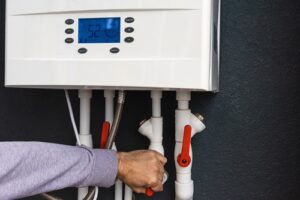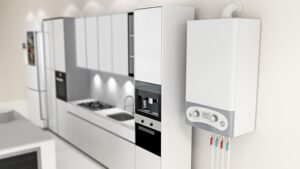In the quest for optimal comfort and efficiency within our homes, the choice of household appliances plays a pivotal role. Among these, the water heater stands as a silent hero, ensuring a seamless supply of hot water for our daily needs. In recent years, homeowners have increasingly turned their attention towards a revolutionary solution – tankless water heaters.
These compact and energy-efficient devices have sparked a paradigm shift in the way we experience hot water, offering a myriad of benefits that extend beyond mere convenience.
In this article, we embark on a journey to unravel the manifold advantages that tankless water heaters bring to homeowners.
From their space-saving design to energy efficiency and cost-effectiveness, we delve into the reasons why more and more households are making the switch. Join us as we explore how these innovative appliances not only cater to our daily needs but also contribute to a sustainable and eco-friendly living environment.
Whether you’re contemplating an upgrade or seeking insights into the world of tankless water heaters, this exploration promises to shed light on the transformative benefits awaiting homeowners who choose to embrace this cutting-edge technology.
Endless Hot Water From a Tankless Water Heater
The endless hot water supply of a tankless water heater is one of its standout features, providing a continuous and on-demand source of hot water for various household activities. This functionality is in stark contrast to traditional tank water heaters, which store and preheat a finite amount of water. Here’s how the endless hot water supply of tankless water heaters works:
On-Demand Heating:
Tankless water heaters operate by heating water only when there is a demand for it. When a hot water tap is turned on, sensors within the unit detect the flow and activate the heating element or burner. This instantaneous heating process ensures that hot water is available as soon as the tap is opened, eliminating the need for a storage tank to maintain a reservoir of preheated water.
No Waiting Time:
Unlike tank-based systems that may require time to refill and reheat the stored water, tankless water heaters provide hot water almost instantly. This is particularly advantageous for activities that demand a consistent and immediate supply of hot water, such as taking showers, doing dishes, or running multiple appliances simultaneously.
Continuous Flow:
The design of tankless water heaters allows for a continuous flow of hot water as long as there is a demand. This makes them ideal for households with high hot water usage, as the unit adapts to varying flow rates without the risk of running out. Large families, for example, can enjoy consecutive showers without the fear of depleting the hot water supply.
Consistent Temperature:
Tankless water heaters maintain a consistent temperature throughout water usage. Unlike traditional tanks that may experience fluctuations in temperature as hot water is used and replaced with cold water, tankless systems provide a stable and reliable temperature for the duration of the demand.
Adaptability to Various Needs:
Tankless water heaters can adapt to various hot water needs simultaneously. Whether you’re running the dishwasher, doing laundry, and taking a shower at the same time, the unit adjusts to the demand, ensuring a continuous supply of hot water without compromising temperature or pressure.
Efficient Use of Energy:
The on-demand heating nature of tankless water heaters contributes to energy efficiency. Traditional tank heaters must continuously keep a large volume of water hot, leading to standby heat losses. In contrast, tankless units only use energy when hot water is needed, reducing overall energy consumption and providing cost savings in the long run.
In summary, the endless hot water supply of tankless water heaters is a result of their responsive on-demand heating mechanism, providing homeowners with a consistent and immediate source of hot water for all their daily requirements. This feature not only enhances convenience but also contributes to energy savings and a more efficient use of resources.
Energy Efficiency of a Tankless Waterheater
The energy efficiency of tankless water heaters is a key benefit for homeowners, offering several advantages over traditional tank water heaters. Here’s an elaboration on how tankless water heaters contribute to energy efficiency:
On-Demand Heating:
As stated above briefly, tankless water heaters operate on an on-demand basis, only heating water when needed. This is in contrast to traditional tank water heaters, which keep a large volume of water continuously heated, leading to standby heat losses. The on-demand heating mechanism of tankless units reduces energy consumption, as they don’t waste energy maintaining a reservoir of hot water.
Reduced Standby Heat Loss:
Traditional tank water heaters are prone to standby heat loss, where the stored hot water loses heat over time, especially when not in use. Tankless water heaters eliminate this issue, as they don’t store hot water. This absence of standby heat loss contributes significantly to overall energy efficiency.
High Thermal Efficiency:
Tankless water heaters often boast high thermal efficiency ratings, which measure how well the unit converts energy into heat. Many tankless models have efficiency ratings well above 90%, ensuring that a large percentage of the energy input is effectively used to heat water.
Modulation Technology:
Modern tankless water heaters often feature modulation technology. This technology adjusts the power output based on the hot water demand. When the demand is low, the unit operates at a lower capacity, further optimizing energy usage. This ability to modulate ensures efficient energy utilization, especially during periods of low demand.
Longevity and Reduced Energy Waste:
Tankless water heaters tend to have a longer lifespan compared to traditional tank systems. This longevity contributes to energy efficiency by reducing the frequency of replacements and associated manufacturing processes. Additionally, the durability of tankless units means less energy is wasted on manufacturing and disposing of short-lived water heaters.
Zone Heating:
Some tankless water heaters allow for zone heating, enabling homeowners to heat specific areas or fixtures within the home. This targeted heating approach minimizes energy waste by avoiding the unnecessary heating of unused areas.
Gas vs. Electric Efficiency:
Tankless water heaters come in both gas and electric models. Gas-powered tankless units typically have higher efficiency ratings than electric ones. However, advancements in electric tankless technology have led to improved efficiency in recent years, making them a viable option for homeowners seeking energy savings.
In summary, the energy efficiency of tankless water heaters stems from their on-demand heating, reduced standby heat loss, high thermal efficiency, modulation technology, and the potential for zone heating. Homeowners can enjoy lower energy bills, reduced environmental impact, and a more sustainable home with the adoption of a tankless water heating system.
Longevity of Tankless Water Heater Versus Traditional Water Heater
The longevity of a water heater is an important factor for homeowners, as it directly impacts the frequency of replacements and overall cost of ownership. Let’s delve into the longevity aspects of tankless water heaters and compare them to traditional tanked water heaters:
Tankless Water Heaters:
Extended Lifespan:
Tankless water heaters typically have a longer lifespan compared to traditional tank water heaters. On average, a well-maintained tankless unit can last 20 years or more. The absence of a tank, which is susceptible to corrosion and sediment buildup, contributes to the longevity of these systems.
Reduced Wear and Tear:
Since tankless water heaters only operate when hot water is demanded, they experience less wear and tear compared to tanked systems that constantly heat and reheat a stored water supply. The reduced cycling and minimal exposure to high temperatures contribute to the overall durability of tankless units.
Modular Design for Easy Repairs:
Tankless water heaters are designed with modular components, making repairs and replacements more straightforward. If a specific part malfunctions, it can often be replaced individually without the need to replace the entire unit. This modular design adds to the overall cost-effectiveness and longevity of tankless systems.
Scaling and Sediment Resistance:
Tankless water heaters are less prone to scaling and sediment buildup, as they don’t store water. Traditional tank water heaters, on the other hand, can accumulate sediment over time, leading to reduced efficiency and potential damage to the tank. The reduced risk of scaling enhances the longevity of tankless units.
Traditional Tank Water Heaters
Typical Lifespan:
Traditional tank water heaters typically have a lifespan of around 10 to 15 years. This shorter lifespan is partly attributed to the constant heating and reheating of the stored water, which can lead to thermal stress, corrosion, and sediment accumulation over time.
Susceptibility to Corrosion:
Tanks in traditional water heaters are susceptible to corrosion, especially if they are made of steel. The presence of water and oxygen in the tank can promote corrosion, potentially leading to leaks and a shorter lifespan.
Standby Heat Loss Impact:
The standby heat loss inherent in tank water heaters, where the stored water loses heat even when not in use, can contribute to increased cycling and wear on the heating elements. This ongoing thermal stress can impact the longevity of the unit.
Limited Reparability:
Traditional tank water heaters are often less modular, making repairs more involved. If a major component fails or if there is significant tank corrosion, it may necessitate the replacement of the entire unit, potentially increasing the overall cost of ownership.
In conclusion, embracing the technological marvel of tankless water heaters unveils a spectrum of benefits that resonate with the modern homeowner’s quest for efficiency, sustainability, and comfort. The seamless on-demand heating not only ensures an endless supply of hot water but also eradicates the inconvenience of waiting for a tank to refill and reheat. The compact design and adaptability of tankless units cater to the spatial constraints of contemporary living, offering a space-efficient alternative without compromising performance.
Energy efficiency stands as a cornerstone advantage, with tankless water heaters optimizing energy consumption through their on-demand heating mechanism and reduced standby heat losses. Homeowners can relish lower utility bills, and the positive environmental impact of reduced energy waste aligns with the growing ethos of sustainable living.
Moreover, the extended lifespan of tankless water heaters, often surpassing that of traditional tank systems, underscores their durability and long-term cost-effectiveness. The modular design facilitates easier repairs, contributing to a hassle-free maintenance experience.
As we navigate the evolving landscape of home technology, the tankless water heater emerges not merely as a utility but as a transformative element in the way we experience daily life. It caters to our immediate needs while embodying a commitment to efficiency, conservation, and the pursuit of a greener, more sustainable future. For homeowners seeking a reliable, space-saving, and energy-efficient solution, the tankless water heater stands as a beacon of innovation, promising not just a stream of hot water but a flow of enduring benefits that redefine the essence of home comfort.
